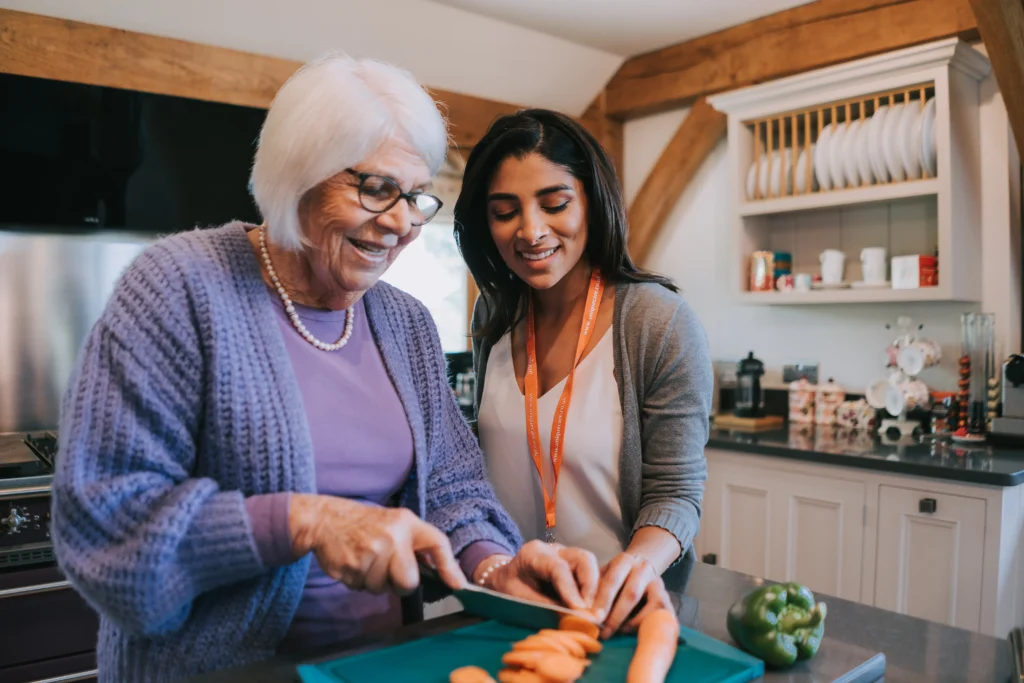January can be a challenging month for many, with shorter days, colder weather, and the post-holiday lull contributing to feelings of sadness or low energy. For older adults, these feelings can be more pronounced, making it essential to prioritise mental wellbeing. Luckily there are some simple steps you can take to make sure you feel happy and connected during the winter months.
Stay connected with loved ones
According to Age UK’s 2024 report, ‘You Are Not Alone in Feeling Lonely’, 7% of people aged 65 and over in the UK—equivalent to 940,000 older individuals—often feel lonely. This statistic highlights the importance of maintaining strong social connections, especially during the winter months when isolation can feel more intense.
There are plenty of ways to stay socially connected. Community centres often offer social clubs, craft groups, or gentle exercise classes designed for older adults. Memory cafés provide a welcoming space for people living with memory loss and their families to enjoy activities and connect with others. Volunteering, joining local walking groups, or attending community events are also great ways to meet new people and stay engaged. Finding something enjoyable and consistent can make a real difference in feeling more connected and supported.
One client perfectly summed up the impact of regular social interaction, sharing, “My husband has three different carers during a week and they are all consistently cheerful and supportive of him. They come to provide personal care but they do so much more, particularly providing a social interaction which makes a huge difference to brightening up the day for both my husband and myself.” It’s a great reminder that even small, regular interactions can brighten someone’s day and make a real difference to emotional wellbeing—not just for those receiving care but for their loved ones too.
Embrace routine and purpose


Having a daily structure can provide a sense of control and purpose, helping to reduce feelings of anxiety and low mood. For older adults, incorporating simple, consistent activities into each day—such as morning stretches, afternoon hobbies, or scheduled social calls—can help create a comforting sense of normality.
Jayne Vale, Dementia Specialist at Unique Senior Care, shares, “Having a routine can be incredibly grounding for older adults, especially during the winter when days feel shorter and moods can dip. A regular routine offers a sense of control and stability, which can ease anxiety and improve overall mood. Simple things like getting up at the same time, enjoying meals at regular intervals, and having light activities or social time in the afternoon can help ease anxiety and lift mood. For those living with dementia, that predictability can be especially comforting. It doesn’t have to be anything big—just small, steady habits that make the day feel more manageable and enjoyable.”
Get moving
Staying active is one of the best ways to lift your mood and reduce stress. Even simple activities like gentle stretching, a short walk around the neighbourhood, or light gardening can help keep your body moving and release those feel-good endorphins. Local community centres often run exercise classes designed specifically for older adults, offering not just physical benefits but also a great way to stay socially connected.
The NHS suggests aiming for at least 150 minutes of moderate-intensity activity each week. This might sound like a lot, but it can easily be broken down into small, manageable chunks—activities like chair yoga, tai chi, or even indoor walking are safe and effective ways to stay active, especially during the colder months.
For example, the Knowle and Dorridge Memory Cafe offers Love to Move sessions each week—gentle, chair-based exercises designed to improve coordination and balance. These sessions have become a firm favourite among attendees, offering both physical benefits and opportunities for social engagement. It’s worth exploring whether similar classes are available in your local area to stay active and engaged.
Stimulate the mind
Keeping the mind active is just as important as staying physically healthy, especially during the winter months when it’s easy to feel


sluggish or disconnected. Activities that challenge the brain and spark creativity can help improve mood and keep the mind sharp. Puzzles, reading, learning a new skill, or engaging in creative hobbies like painting or knitting are all excellent ways to stay mentally engaged.
Jayne Vale, Dementia Specialist at Unique Senior Care, explains, “Keeping the mind active is so important for emotional wellbeing and slowing down cognitive decline, especially in older adults. Activities that encourage thinking, problem-solving, and creativity—like puzzles, learning new skills, or even storytelling—help keep the brain engaged and build cognitive resilience. It doesn’t have to be complicated; it’s about finding simple things that spark interest and bring a sense of purpose. Even small, enjoyable mental activities, when done regularly, can contribute to better brain health and overall wellbeing over time.”
Improve sleep quality
Quality sleep is essential for both mental and physical health, yet many older adults experience changes in their sleep patterns as they age. During winter, shorter days and reduced exposure to natural light can further disrupt the body’s internal clock, leading to poor sleep and lower energy levels.
Establishing a consistent bedtime routine can help regulate sleep. Going to bed and waking up at the same time each day supports the body’s natural rhythm. For older adults, getting exposure to natural light during the day—even sitting near a bright window or taking a short walk outside—can help maintain this balance. Limiting long daytime naps to around 20–30 minutes can also support better nighttime sleep.
Creating a calm, comfortable sleeping environment is equally important. Keeping the bedroom cool, dark, and quiet promotes deeper rest. Avoiding caffeine in the afternoon and choosing a warm, caffeine-free drink in the evening can also contribute to better sleep.
If you experience consistent problems with sleep, it’s always a good idea to speak with a GP, who can offer guidance or suggest suitable support.
Seek professional support if needed
It’s important to recognise when professional help might be needed. If feelings of sadness, anxiety, or isolation persist, the first step should be speaking with a GP. GPs are well-placed to assess mental health concerns and can signpost older adults to appropriate services for further support. This might include counselling, therapy, or connecting with local support groups.
GPs can also refer individuals to social prescribers – health professionals based in GP surgeries and community settings who help people access non-medical support in their local area such as befriending services, community groups, gentle exercise classes, and mental health charities.


For those looking for regular social interaction, companionship services can also be a great way to enjoy some company and conversation. Whether it’s sharing a cup of tea, going for a short walk, or simply having a chat, regular visits can make a real difference in easing feelings of loneliness.
Many care providers offer this type of support – for example, we provide 2.5-hour companionship visits for £70 during quiter hours. It’s a great way to access friendly familiar support in the comfort of your own home.
In addition to professional services, many charities and organisations offer helplines and online support. The Samaritans (116 123) provide a free, confidential listening service 24/7, while Mind offers information and guidance for those experiencing mental health difficulties. Reaching out for support is a proactive step towards feeling better and should always be encouraged.
Taking the next steps towards wellbeing
The winter months can be tough, especially for older people who may live alone and find it harder to get out and about. However, taking some small, meaningful actions can make a big difference in supporting mental wellbeing. Whether it’s staying connected with loved ones, embracing a daily routine, nourishing the body with wholesome food, or seeking professional support, each step contributes to a healthier and more positive mindset.
If you think regular companionship could help brighten your or a loved one’s day, why not have a chat with our friendly team? We’re always here to talk through how regular support and social interaction could make a real difference. Reach out to see how we can help.
Jo joined Unique Senior Care as a Carer in 2011, transitioning from a nursing background. With 25 years of experience in health and social care, including mental health and children with disabilities, Jo has embraced numerous growth opportunities within the company.
Passionate about learning and development, Jo earned a Level 5 Diploma in this field and is committed to equipping teams with the skills needed for outstanding care.
Jo’s qualifications include advanced training in people handling, risk assessment, safeguarding, basic life support, first aid, health and safety, and dementia care. Jo has also completed numerous workshops and CPD courses, such as the SCIE’s Co-Production webinar.
These accomplishments reflect Jo’s dedication to fostering a culture of safety and excellence in care.



